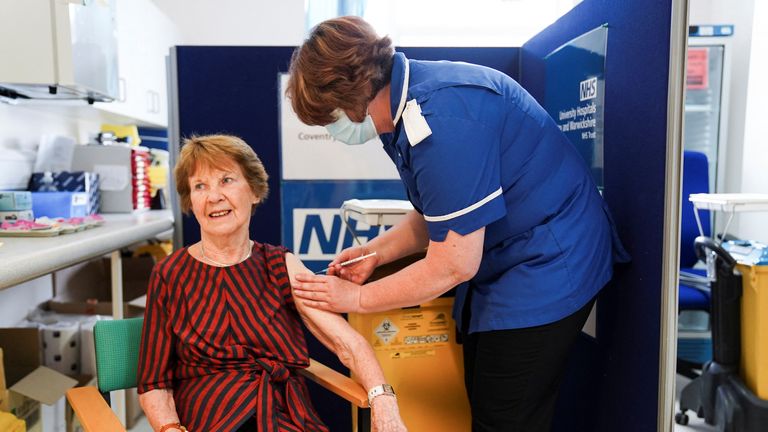[ad_1]
New COVID variants that might evade current vaccines are a greater threat to global public health than the monkeypox outbreak, the chief executive of Pfizer has told Sky News.
A rise in incidents of monkeypox in 21 countries outside Africa, including 78 in the UK, has raised concerns that a significant outbreak is under way, but Albert Bourla said it was very unlikely to become a pandemic.
“We were alerted like everyone else when we saw the increase in cases, because we didn’t have cases and suddenly we do, but I’m not worried right now,” he said.
“We are watching and monitoring very carefully. It looks like this is a situation that is not that transmissible so it’s very difficult for it to become a pandemic, and it looks like there are already vaccines that can work. We’re staying calm and monitoring the situation, but I think right now the real problem is still Covid.”
Mr Bourla was speaking as he announced a groundbreaking programme to provide all of Pfizer’s current and future patent-protected medicines at cost-price to the 45 lowest-income countries in the world.
Pfizer was the first company to develop a working and approved coronavirus vaccine, in partnership with German biotech company BioNTech.
Mr Bourla said the pandemic had emphasised both the pharmaceutical sector’s importance and its wider responsibility.
23 life-saving medicines available for free
Pfizer estimates the initiative could provide cheaper medicines to 1.2bn people and address the historic gap in the accessibility of treatments to populations in the developing world.
Some 23 medicines to treat infectious diseases, cancers and rare and inflammatory conditions will be made available without Pfizer taking a profit.
“I think the world realised the value that a vibrant life sciences sector can bring to society,” Mr Bourla said.
“The life sciences sector is composed of the private sector, academia as we saw with the Oxford AstraZeneca vaccine, for example, and we partnered with BioNTech, a biotech company.
“But it also reminded us that when we have these weapons, these tools to fight disease, we must find ways to get them to people in ways that they can afford.”
Pfizer monitoring variants
Mr Bourla said Pfizer was monitoring the progress of Covid variants in order to adapt the vaccine if required and would submit new formulas to regulators in the UK, Europe, and the United States in due course.
“I have no concerns from a manufacturing capacity, we can build manufacturing capacity that covers the needs of the entire world. Now we are watching the variants and we see that some of them are smarter than others, and they can evade the perfection of pharmaceuticals.”
Follow the Daily podcast on Apple Podcasts, Google Podcasts, Spotify, Spreaker
Asked how long we would be taking COVID vaccines, he said: “I don’t have a crystal ball but there are a lot of variants that can affect this outcome and I think the virus will remain among us.
“We will have the tools to go back to normal life, so I don’t think that because of the variants we have to impose restrictions on our lives.”
[ad_2]


